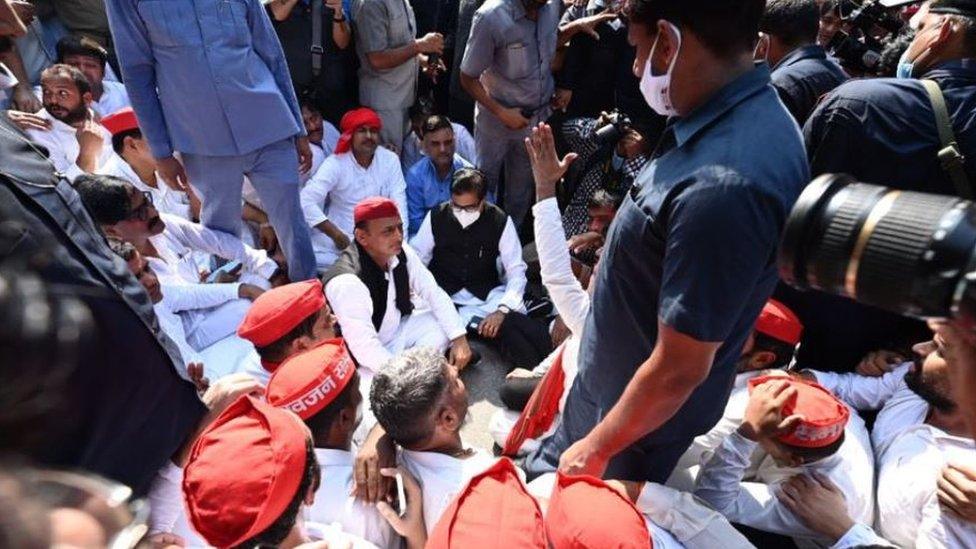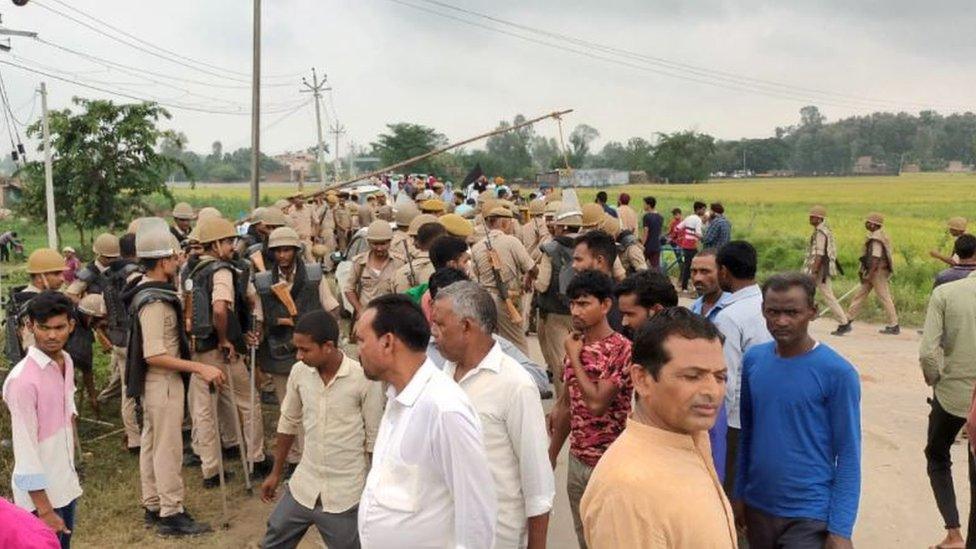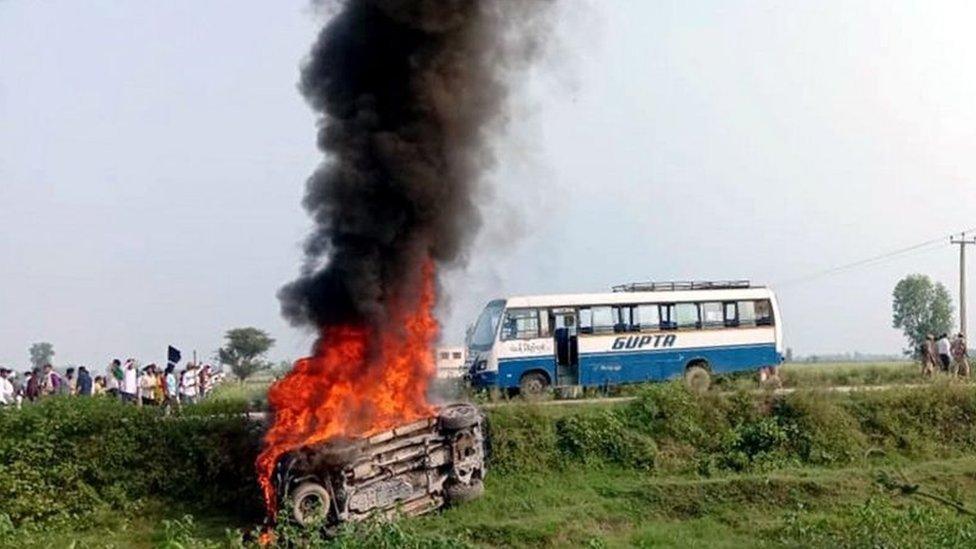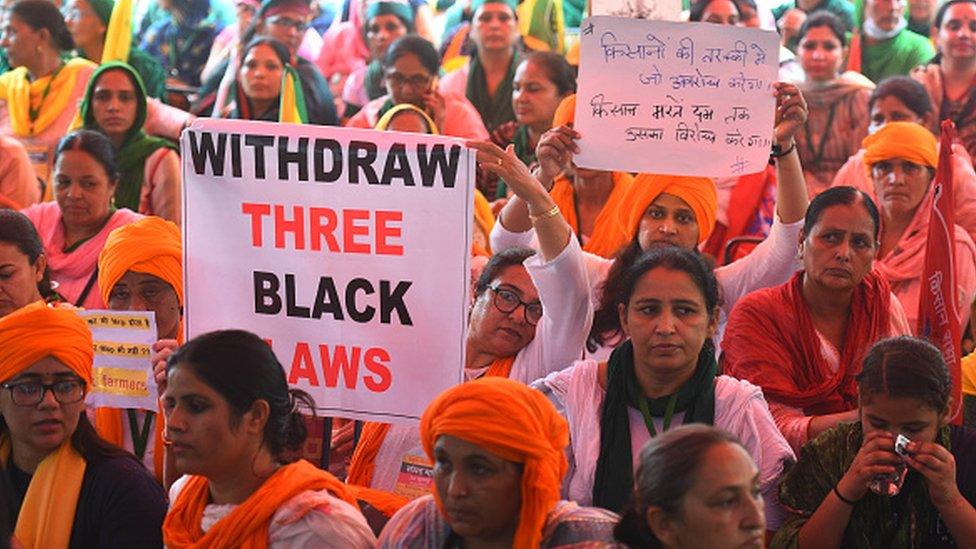Lakhimpur violence: Opposition leaders barred from town
- Published

Former chief minister Akhilesh Yadav protesting in front of his house after he was not allowed to travel
Opposition leaders continue to be barred from visiting the northern Indian town where eight people, including four farmers, died on Sunday.
Violence broke out in Lakhimpur Kheri when farmers tried to protest in front of the motorcade of a federal minister.
Farmers say Ashish Mishra - the son of India's junior home minister Ajay Mishra - ran his car over protesters. The Mishras deny the charge.
Police started an investigation against them after protests from farm unions.
Local media have been running a video that allegedly shows a car running over farmers in the district in Uttar Pradesh state. Farm unions say Ashish Mishra was in the car and he ordered his driver to plough the vehicle into the group of protesting farmers.
But Mr Mishra says he wasn't at the spot when the incident happened. Two workers of the ruling Bharatiya Janata Party (BJP) and the driver were subsequently beaten to death by a mob of protesters. Reports say a fourth person, a journalist, also died in the violence.
Police agreed to investigate the minister and his son only after farmer groups refused to cremate their dead. A large number of security personnel have been deployed as an uneasy calm prevails in the area.
Opposition leaders are still not allowed to visit the district. Akhilesh Yadav, former state chief minister, told the BBC that the government's decision to detain him at his home in Lucknow, the state's capital, was against democratic norms.
"This is nothing but an attempt to stop the opposition from supporting the farmers who are fighting a legitimate battle. They are worried that private players will enter the agriculture sector and hurt their income. They should not be killed for protesting," he said.
Senior Congress party leader Priyanka Gandhi was also detained on Monday while she was trying to enter Lakhimpur. She has described her detention as "illegal".

There is heavy police presence at the site of violence
Violence in Lakhimpur Kheri marks a dramatic escalation in a 10-month-old protest against agriculture reforms that farmers say will benefit private players at their expense.
Tens of thousands of them have been sitting on the outskirts of Delhi since November, demanding that the laws must be repealed.
It is one of the longest farmers-led protests India has ever seen, pitting the community against Indian Prime Minister Narendra Modi and his Bharatiya Janata Party-led (BJP) government.
How did the violence start?
Farm leaders alleged that Sunday's violence started after federal minister Ajay Mishra's son drove his car into a group of protesters.
Farmers had assembled in the district to protest against the visit of Mr Mishra and deputy chief minister Keshav Prasad Maurya.
The farmers were angry with Mr Mishra over his earlier statement in which he said the protests involved just "10-15 people" and that "it would take just two minutes to make them fall in line".

Farmers allege the violence started after a minister's son drove his car over protesters
They had been staging a demonstration on the road when the minister's motorcade allegedly ran over them, killing two protesters and injuring others, farming unions say.
But Mr Mishra has denied the allegations and said his son was not in the car at the time of the incident.
He alleged that farmers threw stones at his vehicle, which led to the driver losing control and ramming into the protesters.
"If my son would've been there, he wouldn't have come out alive," Mr Mishra told news agency ANI.
Police have confirmed the toll, but have not made any arrests so far.

Thousands of farmers have been striking since November against the new farm laws
Why are the farmers protesting?
Thousands have been rallying against the changes for months, blocking major streets in the capital Delhi.
Taken together, the laws will loosen rules around sale, pricing and storage of farm produce - rules that have protected India's farmers from the free market for decades.
They also allow private buyers to hoard essential commodities for future sales, which only government-authorised agents could do earlier; and they outline rules for contract farming, where farmers tailor their production to suit a specific buyer's demand.
Farmers fear the laws will eventually lead to the end of wholesale markets and assured prices, leaving them at the mercy of big corporations.
Many of them have refused to return to their farms until the laws are repealed - and they have stayed through a harsh winter, a deadly second Covid wave and a scorching summer.

Protesting India farmers brave cold, heat and Covid
